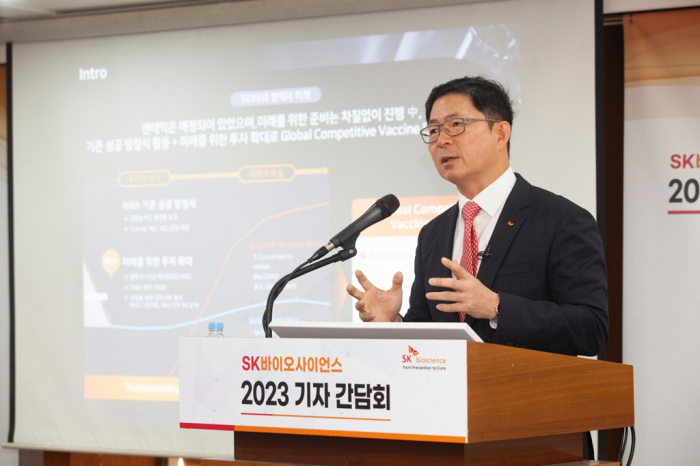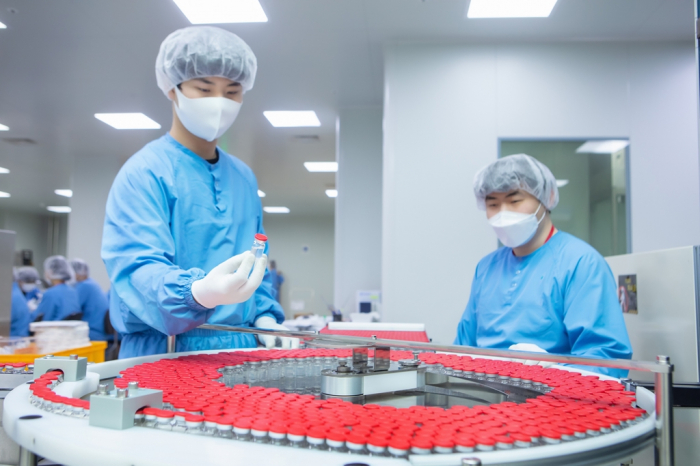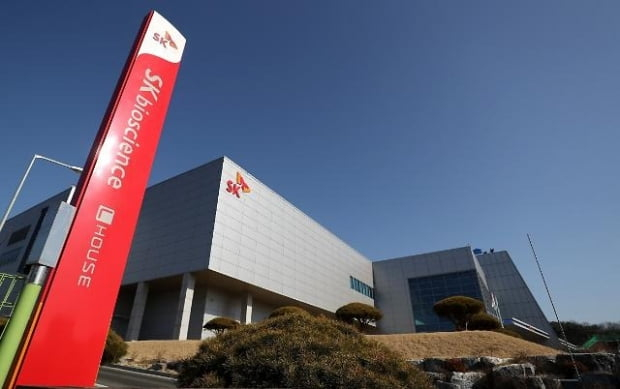SK Bioscience to invest $1.8 billion, seeks M&As for inorganic growth
The CEO says he expects a couple of contract drug manufacturing deals as early as the first half
By Apr 28, 2023 (Gmt+09:00)
LG Chem to sell water filter business to Glenwood PE for $692 million


KT&G eyes overseas M&A after rejecting activist fund's offer


Kyobo Life poised to buy Japan’s SBI Group-owned savings bank


StockX in merger talks with Naver’s online reseller Kream


Meritz backs half of ex-manager’s $210 mn hedge fund



SK Bioscience Co., the drug-making unit of South Korea’s SK Group, plans to spend 2.4 trillion won ($1.8 billion) over the next five years and seek mergers and acquisitions to expand its business portfolio from contract manufacturing to gene therapy development.
The company also expects to soon clinch deals to make vaccines for global pharmaceutical firms under contract development and manufacturing organization (CDMO) programs.
“Our investment over the next five years will determine the future of our company,” Chief Executive Ahn Jae-yong said while unveiling the company’s business strategy at a press conference Friday. “We’re seeking rapid and systematic growth.”
The 2.4 trillion won investment, to be executed through 2027, is five times the amount spent over the past five years.
Half the amount will be used for research and development projects while the other half will be spent on expanding its contract manufacturing facilities and launching new businesses and M&A projects, the CEO said.
Through the investment, SK aims to develop five “blockbuster vaccines” that will boost its sales and profits, he said.
The company’s growth strategy will focus on strengthening its vaccine business, securing new drug development platforms, expanding overseas operations via M&As and building the infrastructure for pandemic and endemic responses, he said.

KOREA’S FIRST COVID-19 VACCINE
SK Bioscience is known for developing Korea’s first COVID-19 vaccine, GBP510, which is sold under the SKYCovione brand.
The COVID-19 vaccine was jointly developed by SK and the Institute for Protein Design (IPD) of the University of Washington under a project funded by the Bill & Melinda Gates Foundation and the Coalition for Epidemic Preparedness Innovations (CEPI).
SK is currently working to add SKYCovione to those approved by the World Health Organization (WHO) for emergency use.
The company has also produced COVID-19 vaccines under the CDMO scheme for its two global pharmaceutical clients – AstraZeneca and Novavax Inc.
CEO Ahn said the company is in talks with several companies for additional CDMO contracts and a deal with a big global drugmaker is likely as early as the first half of this year.
To expand its CDMO business abroad, SK plans to transfer its technology to foreign governments with little access to vaccines and build infrastructure to make vaccines in those countries.
“We’re in talks with countries in the Middle East, Southeast Asia and Latin America for our glocalization projects. We expect a deal or two by the end of this year,” Ahn said.
The company plans to resume the production of its flu vaccine, SKYCellflu, which the company suspended two years ago to focus on the development of a COVID-19 vaccine. The flu vaccine has been approved in 11 countries.

GENE THERAPY PLATFORMS
The CEO said SK is particularly interested in the cell and gene therapy business, represented by messenger ribonucleic acid (mRNA) vaccines.
The mRNA vaccine, employed by Pfizer Inc. and Moderna Inc., is a type that uses a copy of a natural chemical called messenger RNA to produce an immune response.
Messenger RNA has been used to treat hepatosis and rare diseases, but given its relatively short development time, the RNA molecule is now used not just for vaccines but for the treatment of cancer and other illnesses.
Biopharmaceutical companies have been active in forging partnerships with and pursuing acquisitions of smaller competitors specialized in mRNA vaccine development.
The CEO said the company targets to achieve 220 billion won in sales from its own vaccines and other drugs in 2024, up from 44 billion won last year.
Write to Hyun-Ah Oh at 5hyun@hankyung.com
In-Soo Nam edited this article.
-
 Bio & PharmaPhase 3 clinical plan for SK Bioscience's booster shot approved in Colombia
Bio & PharmaPhase 3 clinical plan for SK Bioscience's booster shot approved in ColombiaMar 07, 2023 (Gmt+09:00)
1 Min read -
 Bio & PharmaSK Bioscience's SKYCellflu approved by Chilean health authority
Bio & PharmaSK Bioscience's SKYCellflu approved by Chilean health authorityFeb 02, 2023 (Gmt+09:00)
1 Min read -
 COVID-19SK Bioscience seeks WHO nod for prompt COVID vaccine sale
COVID-19SK Bioscience seeks WHO nod for prompt COVID vaccine saleSep 08, 2022 (Gmt+09:00)
1 Min read -
 Bio & PharmaSK Bioscience wins marketing license for Korea's first COVID-19 vaccine
Bio & PharmaSK Bioscience wins marketing license for Korea's first COVID-19 vaccineJun 29, 2022 (Gmt+09:00)
2 Min read -
 Bio & PharmaSK Bioscience seeks multi-billion-dollar M&As, eyes gene therapy sector
Bio & PharmaSK Bioscience seeks multi-billion-dollar M&As, eyes gene therapy sectorMar 31, 2022 (Gmt+09:00)
3 Min read -
 EarningsSK Bioscience posts record earnings driven by COVID-19 vaccines
EarningsSK Bioscience posts record earnings driven by COVID-19 vaccinesFeb 08, 2022 (Gmt+09:00)
3 Min read -
 COVID-19SK Bioscience to sell Novavax COVID-19 vaccine in Thailand, Vietnam
COVID-19SK Bioscience to sell Novavax COVID-19 vaccine in Thailand, VietnamDec 24, 2021 (Gmt+09:00)
2 Min read -
 COVID-19War for bio talent intensifies as S.Korea works on mRNA vaccines
COVID-19War for bio talent intensifies as S.Korea works on mRNA vaccinesAug 05, 2021 (Gmt+09:00)
3 Min read


